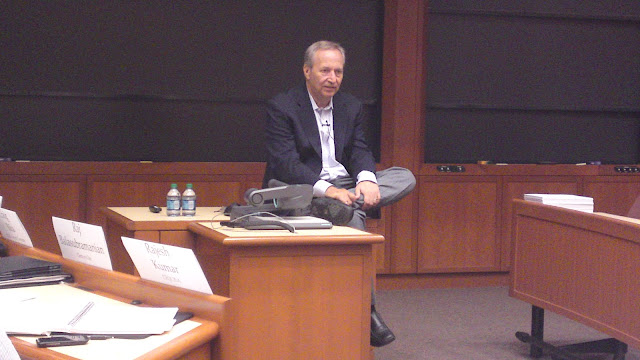 |
| Professor Larry Summers, pausing before responding to a question from an AMP student |
Lawrence "Larry" Summers
Prof. Lawrence Summers, former US Secretary of the Treasury (1999-2001), former Director of the White House United States Economic Council (2008-2010). He was also the 27th President of Harvard University President (2001-2006). He became one of the youngest individuals in recent history to be named as a tenured member of the Harvard University faculty.
 A hugely intelligent and brilliant intellectual, Professor Summers spoke on US policy prescriptions in the wake of the worst financial crisis to hit the US. His views are thought provoking, America-centric and highly insightful.
A hugely intelligent and brilliant intellectual, Professor Summers spoke on US policy prescriptions in the wake of the worst financial crisis to hit the US. His views are thought provoking, America-centric and highly insightful.Discussions and Q&A
US and Global Economy
- Most of the time, economies are self-calibrating but there are moments when markets become avalanches, such as what happened recently
- The numbers of the current crisis are worse than those of 1929
- There is a need to address the global downturn
- Europe implemented stimulus measures
- US exports can happen only if other countries buy
- The irony is that there was too much confidence, that let to too much borrowing and spending
- Today, there is a sense of normalcy but joblessness continues to be ten million short of employment
- There is a need to stimulate domestic demand since the lack of demand hampers production which in turn affects employment
- Government must also move towards balancing the budget
- The core strength of the European economy is Germany
- Over the last 15 years, Germany has succeeded in becoming more competitive, while the rest of Europe has not
- The core question is that how will the rest of Europe service its debt
- labor contrary to the EU's desire is not labor because of cultural and national barriers
- The European central bank needs to adopt a more expansionary policy
- Speculation is contributing to high oil prices
- Critical questions:
- How do we bring the financial markets to a place where it can be successfully managed?
- What is the right kind of policy response?
- It is strange that when regulators assess the appropriate kind of regulation, they invariably ask financial institutions for guidance
- Nobody ever accomplishes anything who doesn't know what he wants to accomplish
- Ask yourself: what will be different about this place when you leave than it was when you came?
- If everything is a priority then nothing is a priority
- Success depends on everybody being able to challenge everybody
- Japan moved too slowly and was too episodic in addressing concerns
- Japanese GDP numbers look worse than the USA
- Japan not too successful in making economy flexible and was unsuccessful in implementing structural reforms










